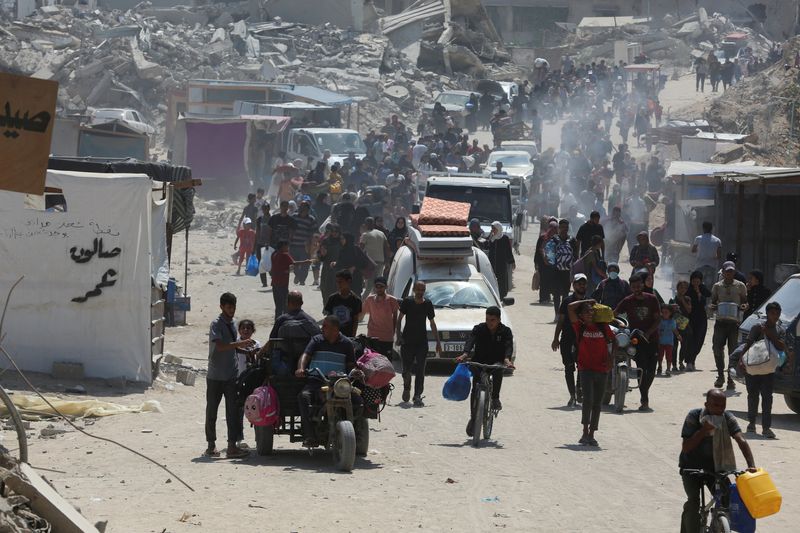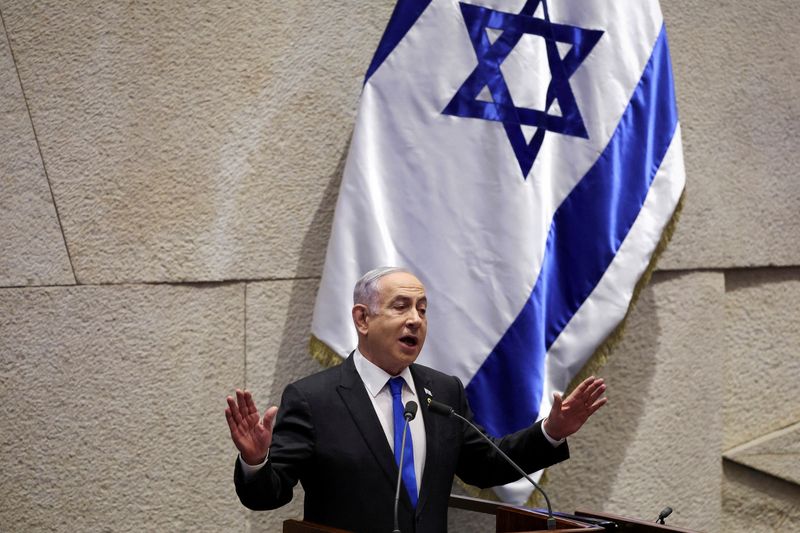By Nidal al-Mughrabi, Maayan Lubell and Hussam Al-Masri
CAIRO/JERUSALEM/GAZA (Reuters) -Palestinian residents of eastern neighbourhoods of Khan Younis in the southern Gaza Strip fled their homes on Tuesday as Israeli tanks advanced deep into the area after Israel ordered the population to evacuate.
The tanks pushed into the Khan Younis town of Bani Suhaila and several districts nearby were bombed for a second day, forcing tens of thousands of civilians to seek refuge elsewhere.
Israel said its action - the latest in a series of major assaults in recent weeks in parts of Gaza where it had long since claimed to have rooted out Hamas - was intended to prevent the militant group's fighters from regrouping.
Gaza health officials said Israeli military strikes since Monday killed at least 80 Palestinians in the Khan Younis area - adding to a death toll of more than 39,000 in nearly 10 months of warfare, according to Gaza authorities' figures.
The Israeli military said Hamas and other groups used those areas to renew attacks, including firing rockets.
Many of the newly displaced families said they had to spend the night in the streets as they searched in vain for a space as western Khan Younis and central Gaza areas were overcrowded. Some of them said they had to flee under Israeli fire.
"For us, the most basic of essentials in our lives are not available," a woman, Ibtihal Al-Breim, told Reuters in Khan Younis. "Basic needs (like) water which we had to carry, the electricity, of course, is cut off, food is cut off, let alone the expensive prices, and there's no work."
"And then suddenly you're told now you have to leave. Without prior warning, suddenly rockets began falling on us. We had to leave and I wasn't intending to leave - but then there were quadcopters and aircraft, we saw the tanks with our own eyes," she added.
U.N. officials described scenes of despair on Tuesday as Israeli airstrikes hit the area.
"The situation is impossible," the U.N.'s Palestinian refugee agency UNRWA said on X.
In a later post, it said there was nowhere safe to go in Gaza.
"People are exhausted from the continuous displacement and unlivable conditions & they are trapped in increasingly small & overcrowded areas," it said.
The Israeli military said dozens of militants had been killed in Khan Younis by its tanks and warplanes or in close-quarter combat. Weapon caches and tunnels used by the militants had been destroyed, it said.
Palestinian medics said one person was killed in an Israeli airstrike in the area on Tuesday. The Gaza health ministry does not distinguish between combatants and non-combatants. Health officials have said most of those killed have been civilians.
Residents in Khan Younis said tanks remained stationed deep inside Bani Suhaila, east of downtown Khan Younis. Soldiers were seen searching inside the town's main cemetery, while others commandeered roofs of high-rise buildings, firing their guns toward the western areas from time to time, residents said.
In the Bureij camp in the central Gaza Strip, where six Palestinians were killed by an Israeli airstrike on a house, some residents said they had received calls from Israeli security officers ordering them to leave their homes. Some families headed towards the Nuseirat camp to the west.
Later on Tuesday, residents said Israeli forces had blown up several homes in Rafah, where Israel said its operation since May aimed to dismantle the last Hamas battalions.
CEASEFIRE HOPES
Israeli Prime Minister Benjamin Netanyahu, who is in Washington this week, told families of hostages held in Gaza that a deal that would secure their release could be near.
Hamas-led fighters triggered the war on Oct. 7 by storming into southern Israel, killing 1,200 people and taking 250 captives, according to Israeli tallies. Hamas and other militants are still holding 120 hostages; Israel believes around a third of them are dead.
Netanyahu was in Washington and is expected to meet U.S. President Joe Biden later this week after making an address to Congress. Speaking in the U.S. capital on Monday to families of hostages, he said: "The conditions (for a deal) are undoubtedly ripening. This is a good sign."
Months of efforts mediated by Egypt and Qatar to reach a ceasefire gained momentum in recent weeks under a proposal outlined by Biden in May.
"Unfortunately, it will not take place all at once; there will be stages. However, I believe that we can advance the deal," Netanyahu said.
Senior Hamas official Sami Abu Zuhri told Reuters there was nothing new in Netanyahu's stance.

"Netanyahu is still stalling and he is sending delegations only to calm the anger of Israeli captives' families," he said.
An Israeli negotiation team is due on Thursday to resume talks that would include hostages being released in return for Palestinian prisoners held in Israeli jails. According to two Egyptian security sources, Israel informed Egypt that an Israeli delegation would arrive in Cairo on Wednesday evening.
